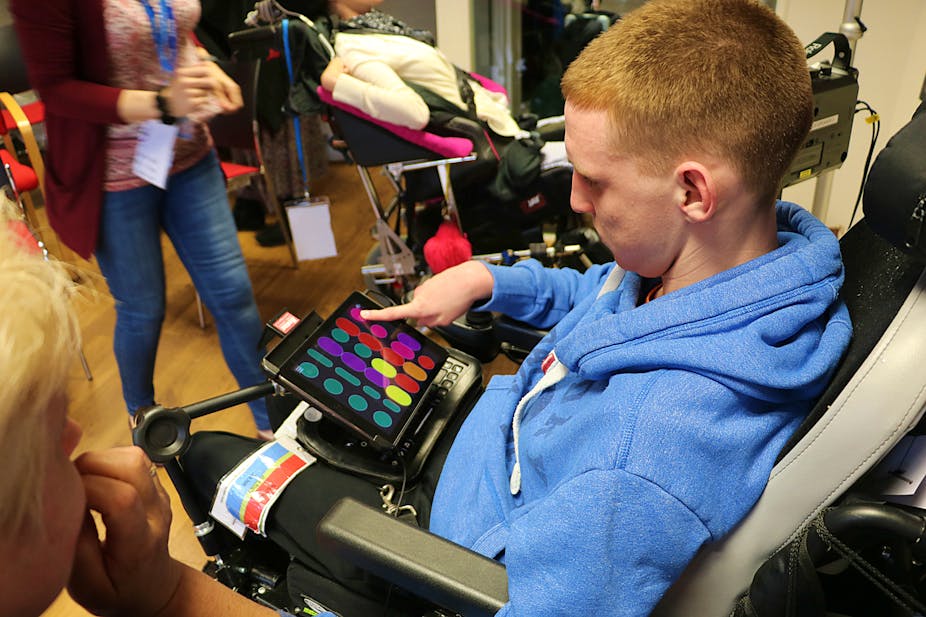People with learning disabilities can often find themselves feeling excluded when it comes to making decisions about their lives. This can range from everything, from shopping to making music or even bringing up a baby. Sometimes this exclusion can be exacerbated by the kind of support that they receive from social services – but it can also be countered by sensitive personal assistance or support.
In a recent research project, which brought together disabled and non-disabled researchers, we looked at ways to improve this – and how to include people with learning disabilities in decisions.
Part of the project found that by taking active roles in the arts, people with learning disabilities can lead the way towards meaningful inclusion. Beth Richards, an actress with learning disabilities, led part of the research about people with learning disabilities on TV. She found that actors with learning disabilities are often limited to roles which depict the “disability”, the tragic or dependent life of the character, or their effect on others around them. A successful actor with learning disabilities, for instance, told her:
I wish TV makers would think more creatively and give people with learning disabilities any role – romantic, fantasy, comedy, shop assistants, office workers. I’d like to play James Bond, Romeo, Dobby in Harry Potter or a detective or many other roles.
The Queen’s Birthday Honours in June 2018 include an MBE to the actress with Downs Syndrome, Sarah Gordy, for her “services to the arts and people with disabilities”. As Gordy said upon receiving the award, “diversity is an opportunity, not a problem”. She is good proof of that.
But there is a lack of accessible information. There is no shortage of talented actors and drama companies supporting people with learning disabilities, but the TV industry and its workings are still shrouded in jargon. Processes such as commissioning, auditioning and scriptwriting tend to exclude those who do not have someone to help them navigate all this.
In another part of the research, my colleague Marina Gall looked in detail at how music making can be transformed by the Open Orchestras approach in which young people with multiple and complex needs are enabled to learn musical skills, play in ensembles and become music makers. A new technological instrument – the Clarion – can be played on computers and iPads, using one’s hand, a small sensor on any part of the body, or via a person’s gaze. It can be adapted to suit most students’ physical needs.
One of the co-founders of Open Orchestras, Doug Bott, told our research team, that the approach is “personalised around the individual young person”. But at the same time, it’s trying to ensure that music is an important part of the curriculum for all young people, and has been immensely successful in changing perceptions of people with learning disabilities. This is not therapy, it’s a route to making music and to performance.
Making decisions
People with learning disabilities also face inequalities and problems in the NHS, as well as in a cash-strapped social care system. For instance, since the Mental Capacity Act 2005 came into force, support staff are legally required to support people with learning disabilities to develop their own capacity to make a decision. What we saw in our data was that people with learning disabilities can be proactive in seeking out this support – and we recorded conversations with personal assistants where people wanted to talk about decisions relating to safety, health or simply about future cooking plans. The skills that a personal assistant needs to have are to listen, look out and be responsive to the people they are supporting.
One of the key messages from our project is that health and social care practices sometimes get stuck. We used the word “institutionalised” for those times when professionals stick to a rigid and inflexible way of doing things, leaving the disabled person without the power to have a voice.
These difficult moments were also highlighted by actors with learning disabilities who helped to interpret our data. Our research benefited from a collaboration with the Misfits Theatre Company in Bristol, showing how sensitive interactions between people with learning disabilities and their personal assistants were often the trigger for good decisions, and giving those with disabilities a feeling of control over their own lives.
But quite small comments can create problems, spoiling an empowering relationship. The theatre company made a brilliant video called A Good Match about their own perspectives and experience of managing relationships with a personal assistant. One of the Misfits actors said: “It’s my house … and I don’t want my (personal assistant) telling me what I can and cannot do.”
After looking at a range of activities that can exclude or include people with learning disabilities, we concluded that inclusion happens when three things come together. Sometimes people with learning disabilities are included because of changes to technology, as in the Open Orchestras approach. At other times, they are included better because of new ways of doing something, or through new skills that they may learn – as actors, or as TV performers.
But at the heart of all this is a new belief in the equal value of people with learning disabilities. This is why we recommend that social care services need to focus less on what people cannot do, but instead promote a genuine belief in what people with learning disabilities can do – with the right support.

